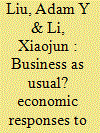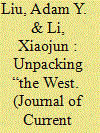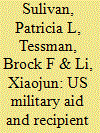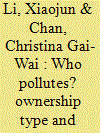|
|
|
Sort Order |
|
|
|
Items / Page
|
|
|
|
|
|
|
| Srl | Item |
| 1 |
ID:
165981


|
|
|
|
|
| Summary/Abstract |
What is the relationship between political tensions and economic relations? In this study, we explore this question by examining how Japan’s nationalization of the Diaoyu/Senkaku Islands, a territory much disputed with China, has affected bilateral trade between the world’s second and third largest economies. Using monthly data, we find that the nationalization imbroglio has negatively affected the amount of goods Japan exports to China, with the effect being most pronounced for highly salient and visible products such as automobiles and cameras; these experienced immediate and dramatic drops lasting up to 12 months. In contrast, raw materials and intermediate goods were not affected at all; some even experienced increased exports. These findings suggest that consumer and corporate responses to political tensions may follow different logics. For consumers, certain political tensions, especially those involving enduring territorial disputes, could override entrenched economic interests and preferences, at least in the short term. In these instances, it will no longer be business as usual.
|
|
|
|
|
|
|
|
|
|
|
|
|
|
|
|
| 2 |
ID:
151285


|
|
|
|
|
| Summary/Abstract |
Many observers see mutual distrust as a major reason for increasing tensions in East Asia, but few studies systematically explore exactly how trust, or the lack of it, influences international cooperation in the region. We examine the microfoundations of international trust in East Asia by analyzing an original survey of Chinese urban residents’ attitudes toward Japan and South Korea. We find that generalized trust, or the belief that other nations have benign intentions, provides the most important driving force of trust toward Japan and South Korea. This, in turn, has a positive effect on preferences for interstate cooperation. We also find that, contrary to conventional wisdom, nationalism and historical memory have little or no effect on international trust. Our analysis enhances our broader understanding of international trust by clarifying its sources and consequences. It also suggests some important policy implications for Sino–Japanese relations and Chinese foreign policy.
|
|
|
|
|
|
|
|
|
|
|
|
|
|
|
|
| 3 |
ID:
189048


|
|
|
|
|
| Summary/Abstract |
Under pressure to choose between the U.S. and China, Southeast Asian countries have adopted a hedging strategy: deepening economic relations with China while strengthening security cooperation with the U.S. How does the region's public view this strategy? With tensions rising in South China Sea territorial disputes, are more nationalistic individuals more likely to oppose hedging? Using an original public opinion survey conducted in the Philippines, we find that while an overwhelming majority of respondents were concerned about the territorial disputes, more nationalistic Filipinos were no more concerned than less nationalistic ones. Further, more nationalistic Filipinos were more likely to view economic relations with China as important for the Philippines and to approve of Duterte's China policy, which follows the logic of hedging. These surprising findings suggest that under the shadow of great-power competition, the link between domestic politics and foreign policy is nuanced in the Philippines, and Southeast Asia in general.
|
|
|
|
|
|
|
|
|
|
|
|
|
|
|
|
| 4 |
ID:
163465


|
|
|
|
|
| Summary/Abstract |
The Belt and Road Initiative (BRI) is often regarded as a vehicle of China's economic statecraft in that country's endeavour to expand its geopolitical influence overseas through investments and trade. In today's globalized world, however, the vast majority of international economic interactions are conducted by firms, not states. The success of the BRI therefore depends on whether and how China can compel its firms to behave in a way that serves the strategic interests of the state. Using a unique firm-level survey, we find that Chinese firms' interests in the BRI do not necessarily align with those of the state. Despite similar perceived risks and challenges to participation in the BRI among private and state-owned firms in China, state-owned enterprises are much more likely than private ones to express a willingness to participate in the BRI. These findings highlight the importance of state control in the exercise of economic statecraft.
|
|
|
|
|
|
|
|
|
|
|
|
|
|
|
|
| 5 |
ID:
189907


|
|
|
|
|
| Summary/Abstract |
Recent public opinion polls conducted in Europe and the United States show increasingly negative views of China. Does the Chinese public hold similar views of “the West”? Conducting a two-wave survey in China, we found great divergence and asymmetries in Chinese public perceptions. First, Chinese views of European countries and the US diverge sharply, despite these countries being typically grouped together as “the West” in mainstream English and Chinese discourses; the Chinese viewed the US much more negatively than Europe. Second, whereas the Chinese reciprocated American antipathy, there was an asymmetry in public perceptions between China and Europe, with the Chinese expressing much greater favourability towards European countries than the other way around, though the degree of favourability still varied by country. Analyses of respondent attributes also yielded insights that both confirm and challenge some of the conventional wisdom regarding age, education, and party membership in Chinese public opinion.
|
|
|
|
|
|
|
|
|
|
|
|
|
|
|
|
| 6 |
ID:
106271


|
|
|
|
|
| Publication |
2011.
|
| Summary/Abstract |
What can states expect to receive in return for the military aid they provide to other states? Can military aid buy recipient state compliance with donor objectives? In this study, we systematically investigate the effects of US military assistance on recipient state behavior toward the United States. We build on existing literature by creating three explicit theoretical models, employing a new measure of cooperation generated from events data, and controlling for preference similarity, so that our results capture the influence military aid has on recipient state behavior independent of any dyadic predisposition toward cooperation or conflict. We test seven hypotheses using a combination of simultaneous equation, cross-sectional time series, and Heckman selection models. We find that, with limited exceptions, increasing levels of US military aid significantly reduce cooperative foreign policy behavior with the United States. US reaction to recipient state behavior is also counterintuitive; instead of using a carrot-and-stick approach to military aid allocations, our results show that recipient state cooperation is likely to lead to subsequent reductions in US military assistance.
|
|
|
|
|
|
|
|
|
|
|
|
|
|
|
|
| 7 |
ID:
143783


|
|
|
|
|
| Summary/Abstract |
What is the relationship between ownership type and environmental performance in Chinese firms? Using a survey of over 1,000 industrial firms in 12 Chinese cities in 2006, this article tests a number of competing hypotheses linking ownership type to environmental performance. The results show that small and medium state-owned enterprises (SOEs) on average spend less on pollution abatement technologies and are less likely to meet national emissions standards, compared to privately owned enterprises (POEs) and foreign invested enterprises (FIEs). However, the environmental performance of the largest SOEs matches that of their private and foreign counterparts. These findings are complemented by qualitative interviews and archival research conducted in 2012.
|
|
|
|
|
|
|
|
|
|
|
|
|
|
|
|
|
|
|
|
|